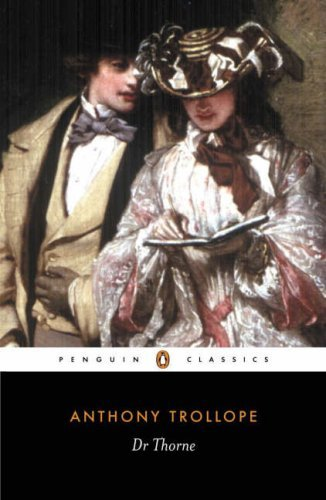“Frank must marry MONEY.”
*spoilers ahead*
In his novel Doctor Thorne (1858), Anthony Trollope takes as his prominent theme the debasement of the institution of marriage in the supposedly Christian genteel classes of England. The narrator castigates the single-minded obsession with wealth and position that drives many families to maneuver marital matches for their children solely for the benefit of finances and status, reducing what should be a holy covenant between a son of Adam and a daughter of Eve to merely a business transaction. Marriage is completely commercialized, and people utterly commodified. The mantra “Frank must marry MONEY”, repeated ad nauseum throughout the novel, makes it seem like Frank, the hero in question, isn’t actually to exchange vows at the altar with a person at all, but rather with a sack of cash and bank notes.
This is taken to sadly comical extremes with the heroine Mary Thorne, who is either loathed and shunned as the plague or nearly worshiped and desired above all else as a possible wife for her lover Frank Gresham by his family based on her oscillating financial status alone. Even those who genuinely love her, such as the Squire Gresham (Frank’s father), who readily concedes that she is the most wonderful young woman he knows and would wish for nothing more than that she should become his daughter-in-law, ultimately bows to Mammon and sacrifices her on his altar, because this is what the world desires (and what his domineering, Lady Macbeth-type wife constrains him to do).
The romance between Frank and Mary is very sweet. It is purposely so, to contrast with the shallowness of the people who have set themselves staunchly against the couple. The scene where Frank proposes to Mary while she rides a donkey – and the narrator does not let the donkey play an invisible or insignificant role here – surely must have conjured up the Virgin Mary to Victorian readers, and all the innocence and purity such a reference denotes. (Sadly the donkey didn’t make the cut for the 2016 film adaptation by Julian Fellowes – who also directed Downton Abbey – and which was nicely done, by the way; I guess the donkey symbolism would be lost on modern, biblically illiterate viewers.) Every time Frank respectfully but resolutely refused his parents’ injunction that he may not marry Mary, I cheered him on. When he claimed he would become a farmer if necessary, to support Mary, and was genuinely ready and willing to do so, until the bomb dropped at the end of the story, I along with surely every other reader gave a silent “Bravo!” Frank and Mary are admirable characters and the reader longs for them to persevere against all the odds.
But regarding the end of the story – I am not so sure that I can give Trollope a whooping “Bravo!” for how he chooses to wrap up the narrative. For after all, Frank does marry money in the end! Certainly, he as a character was more than willing to marry Mary for love only, and had determined and planned to do so. I have no fault to pick with Frank. But was Trollope as resolutely determined and brave as an author to have them do so? Did he falter to write an ending where his hero, a high-born aristocrat, actually stoops to take up a farm and plow and sow the land, to the shame and embarrassment, and certainly outright rejection, of his family?
The film adaptation does a good job of making the ending, when the bombshell announcement drops, extremely funny, and this kind of takes the edge off of the story’s ending, which neatly concludes in a manner so that everyone, even the shallow people, are satisfied, and commercial equilibrium is restored, as the Greshams get their money back. Is the reader satisfied though? Obviously, that will depend upon personal opinion. Many might think that an ending where Frank ends up penniless and shunned by his family would not make for a good story. Or some might feel perhaps that my take is too harsh on Trollope – it’s just an endearing romance, and Elizabeth Bennet ends up with her millions too. However, I can’t help but reflect on novels by a contemporary of Trollope, George MacDonald, who takes a different approach to the aristocracy and money. In some of his novels, such as The Landlady’s Master, MacDonald addresses this very issue of the gentility’s obsession with wealth and status, and treats it very seriously as soul-destroying idolatry, namely Mammon-worship. His heroes and heroines reject the love of money outright, and their refusal to bow down to Mammon draws them into greater union with God, as they forgo the treasures of this world and the concerns of men for the things of heaven. Has Trollope missed out on an opportunity to declare Christian truth here? He certainly exposes the problem of rot in aristocratic marriage practices; does he go far enough in his protest of these practices as idolatry and prostitution by the narrative choice he made?
“The Way We Live Now” by Anthony Trollope
